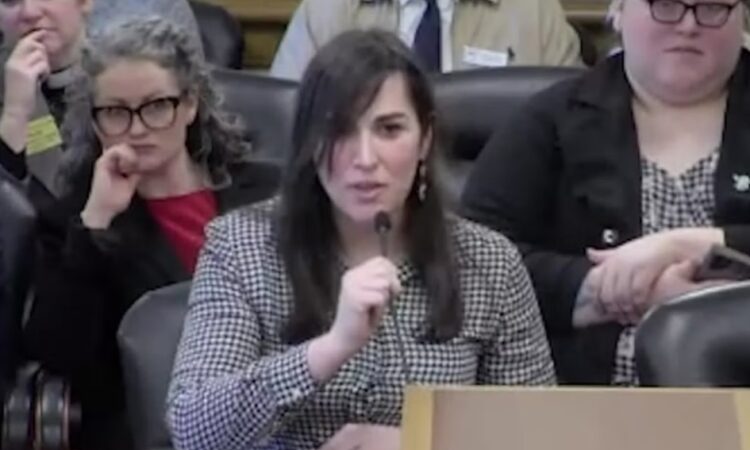
The crusade to vilify those who just want to live life as their authentic self is baffling
‘Do you have a penis’: Arkansas lawmakers launch transphobic attack on witnesses during committee hearing
I had not entered the halls of the Arkansas capitol building since I was in high school. I was nervous about speaking at my first Senate committee meeting, testifying against SB199 as a transgender female and doctor of pharmacy.
This legislation, like so many other bills nationwide, targets and limits access to care for the transgender community and further stigmatizes an already marginalized population. The crusade to vilify those who just want to live life as their authentic self is baffling. Almost as much as the rationale, or lack thereof, behind the movement working to limit or halt care.
The committee meeting began with the author of the bill, Senator Stubblefield, speaking as one of the main sponsors. To me, the words coming out of his mouth sounded like that of a parodied conspiracy theorist. I thought surely no one was taking the gentleman seriously. Then as his rhetoric continued, including the assertion that transitioning is a TikTok based plot being carried out by the Chinese, it became clear that his sentiment was being met in earnest by his colleagues and I began to recoil in my seat. Having two children of my own, hearing a senator speak words like “children” and “orgasm” in the same sentence made me squeamish. Only one member of the public came to defend this bill, while two others were sent from the Arkansas Attorney General’s office.
After their remarks I was up first to speak. While the opposition was given an abundant amount of time to address the committee, we were only given two minutes each. Two minutes to somehow get across my professional experience, personal journey, and how this bill negatively affects my community.
Needless to say, I had to cut out a large portion of what I wanted to speak about. I sat down and began reading feverishly while my hands were shaking. The committee chair allowed me to finish my conclusion since I was in the middle of it when my time expired. Then began the questioning.
Senator McKee from Garland County was trying to corner me into answering his question and stated that there is a ”large body of medical evidence of harm that has come upon people who have gone through these processes”, which he neglected to cite and I obviously don’t agree with. I responded: “I am familiar with the large body of evidence showing that providing good affirming care saves lives.” We went back and forth three times with him getting increasingly agitated with me each time.
He then asked if I was a trans woman, to which I replied back that I am a trans female. Then the most insulting, dehumanizing, egregious question was asked of me: “Do you have a penis?”
I was mortified, which was apparent by the expression on my face and my body language. The room erupted in protest to the question. But it felt like Senator McKee had accomplished his goal, I have never been so publicly humiliated in all my life. In a room full of people, being streamed and broadcast, I was testifying before our elected senators when my lived experience, community outreach, doctoral degree, and most importantly my humanity, was reduced to a single body part. I did not answer. I asked for my rights, demanded decency, and said I would continue with the next question. There were no more questions for me. I went back to my seat, determined to show solidarity while fighting back the tears in my eyes.
I don’t generally face this level of discrimination in person because I have been fortunate enough to create an atmosphere of empathy, education, and professionalism in my life. I was naïve to believe I would be spared the prejudice my peers experience daily. I planned to go in, present good faith testimony, and encourage open dialogue to offer my perspective as a healthcare provider who is also in the transgender community. I again naïvely expected the committee to demonstrate decorum and impartiality in a genuine effort to improve the lives of Arkansans. It quickly became clear the hearing was little more than a formality. The one Democratic senator on the committee deserves special mention. Clarke Tucker was compassionate, logical, and showed an understanding of the imminent and lasting damage this kind of legislation can bring.
As a healthcare provider, I feel it is important to set the record straight on the realities of transgender care. Research is useful when it comes from multiple sources, is peer-reviewed, and properly interpreted. However, I feel that it has become commonplace for outliers to be twisted for political expediency.
Fearmongering by using words such as mutilation and castration is also concerning when, and let me make this abundantly clear, procedures such as surgery on minors do not happen. Furthermore for adults, Gender Confirmation or Affirmation Surgery is still not genital mutilation. Surgery procedures are also very costly, require a long recovery time, and have been burdened by many barriers by medical institutions and insurance companies. So to imply that a child can just go get a surgical procedure done, is simply a lie. The typical transgender minor is prescribed puberty suppression, which delays puberty onset so that the individual has time to discover what works best for them.
The individuals defending the bill could only come up with an increased risk for osteoporosis as a downside to treatment, a decrease in bone mineral density. In the majority of treatment plans bone mineral density is monitored regularly and if it warrants intervention the resulting treatment would consist of calcium, vitamin D, and sunlight supplementation.
In closing, the current practice of medicine across all disciplines in United States is research and evidence based. We have dozens of American medical organizations that support gender affirming care in adults as well as minors. What I find to be particularly disturbing is that we have politicians using grotesque language to flagrantly misrepresent gender affirming care and are effectively attempting to practice their own form of medicine by deeming who can and cannot receive established, lifesaving, evidence based healthcare. Of course, this kind of legislation is devastating to the LGBT+ community of Arkansas, but if passed into law, it sets a grim precedent with potential implications far wider than transgender care.




